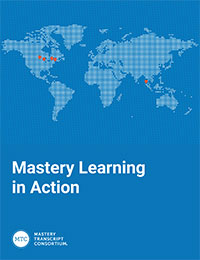Already a member? Log in to the Member Site at members.mastery.org.
MTC Statement: Black Lives Matter
June 5, 2020Assessment: What Students Must Learn
June 28, 2020Mastery Learning in Action


This paper is a culmination of the five Mastery Learning case studies MTC recently published highlighting the incredible work of five of our member schools as they made the journey to mastery learning. MTC developed a framework for change entitled Journeys toward Mastery Learning and the Mastery Transcript™ to support all schools in designing deliberate plans and action steps to build their mastery learning systems. It’s true that most schools do not follow a linear path to transformation; the road chosen and path charted reflect the unique context of the school, its community, its history and traditions, and the degree to which stakeholders are prepared to immerse themselves in each step of the process.
Wherever your school finds itself on the Journey to Mastery Learning, we encourage all schools to use this synthesis and each corresponding Case Study as opportunities for whole-school reflection on your own journey to mastery learning and the Mastery Transcript™. The artifacts shared and insights presented are intended to help any school curious about their own next steps to school-wide change. Teachers, leaders, curriculum specialists, virtually all roles in an educational ecosystem will be inspired by these 5 member schools’ pioneering spirits and continued efforts to create meaningful learning experiences for students in order to change the game for good in schools across America and around the world. –Susie Bell, Director of Member Engagement, MTC

Introduction
Each year, more schools begin the journey to a personalized, mastery-based system. They do so because the traditional education model needs updating to align with the research on learning. It needs updating to prepare students for today’s rapidly changing world. Educators are redesigning schools to motivate and engage students; to help them build the mindsets and traits to be powerful learners; and to develop the full spectrum of knowledge and skills they need to take advantage of challenges and opportunities they will encounter throughout their lives.
In 2019, I visited five member schools of the Mastery Transcript Consortium® (MTC) to find out what mastery learning means to them and how they are implementing it. Some of the schools are long-standing breaking out of traditional models; some are brand new schools borne from the desire to shift the educational paradigm. Some are independent and some public. Some are in the early stages of implementation, while some are well-developed. Some serve highly homogenous, relatively wealthy, educated communities, and one is diverse by design.
Schools use different terms to describe their learning models. For example, Champlain Valley Union High School (CVU) has developed standards-based learning, while Singapore American School (SAS) refers to personalizing learning. Schools are also developing mastery learning in different ways depending on whether they have already made the shift to using standards to align instruction, assessment, and grading. At Tilton School, the mastery approach aims to help students develop five essential skills—communication, critical thinking and decision making, creative engagement, innovation and design thinking and mindfulness—to enhance standards-based instruction, whereas at Northern Cass School District #97, mastery learning (referred to as personalized learning) is their core instructional approach. Regardless of whether mastery learning is an enhancement or an overarching model, all the schools are redesigning so that students are engaged and motivated, have opportunities to apply what they are learning, and discover their potential.
Each school had different starting points on the road to mastery learning. No two stories were alike. Despite this, they landed in remarkably similar places of what it means to personalize learning and design schools around mastery. Common features include:
- Approaching students holistically with attention to intellectual and emotional development;
- Empowering learners with the mindsets and skills to own their learning;
- Engaging and motivating students through projects, interests, and making connections to the real world;
- Employing instructional strategies that help each student reach and master learning targets; and,
- Increasing flexibility of the school to respond to students with timely and differentiated supports and opportunities.
Using the The Journey Towards Mastery Learning (pdf), framework, this paper builds on the case studies of five MTC member schools to highlight how each school is designing a mastery learning system. There is no one model of mastery learning, nor is there one roll-out strategy. Each school has designed and implemented in ways that make sense for them based on leadership, capacity, and opportunity. Each school continues to hone their model as they learn about what works for students.
Wherever your school finds itself on the Journey to Mastery Learning, we encourage all schools to use this synthesis (PDF) and each corresponding Case Study as opportunities for whole-school reflection on your own journey to mastery learning and the Mastery Transcript™.





